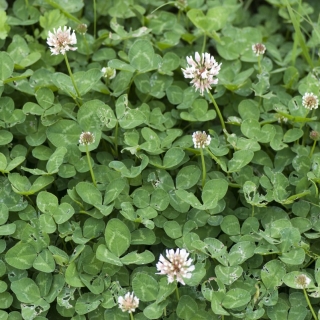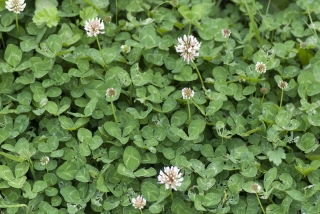Embark on a journey to enrich your garden with the verdant charm of White Clover 'Apolo' (Trifolium repens), an offering that not only beautifies your space but also serves a utilitarian purpose. Known for its resilience and modest height (30-40 cm), this variety is particularly celebrated for its honey-producing capabilities, making it a favourite among beekeepers and nature enthusiasts alike.
White Clover 'Apolo' is remarkably robust, thriving across diverse environmental conditions. It quickly recovers from physical damage, including frequent trampling and grazing, and it is well-suited to withstand low mowing and frost. With its productive nature, it is an ideal choice for establishing permanent green pastures, providing a nutritious source of forage in the form of fresh or dried plant material, rich in proteins and amino acids crucial for the dietary needs of farm animals.
This clover is tolerant of various soil types, flourishing in nearly all conditions except acidic or waterlogged soils. It achieves its best growth in fertile, moderately moist soils with a neutral to slightly alkaline pH. It's important to note that White Clover 'Apolo' does not perform well under dry conditions and requires full sunlight to thrive, as it does not tolerate shade well. For optimal results, sowing can be conducted in spring, summer, or autumn, based on your gardening schedule and needs.
Sowing Rate: 12-15 kg/ha for pure sowing.
Included in your purchase is a 500g packet of White Clover 'Apolo' seeds, complete with instructions for cultivation and a sowing deadline, ensuring you achieve the best possible results in your gardening endeavours. Whether you are looking to cover idle lands or enhance your green spaces, White Clover 'Apolo' stands as an excellent choice for a durable and beneficial cover crop.
GardenSeedsMarket - has been in business for more than a decade and from the very beginning we have made the quality of our products the top priority. Throughout the years we have delivered the best quality goods to tens of thousands of customers from all over the world. Their satisfaction proves that we had chosen the right way.
All seeds we sell are subject to a multi-level quality control checks and only then are carefully packed and dispatched. Our products have been awarded numerous certificates and comply with the highest standards of the European Union. Our employees are experienced gardeners who are more than happy to answer your every question.
Where do our seeds come from?
All of the seeds sold in our shop come from the best producers from across the European Union. Thanks to a long-standing cooperation with them we were able to develop the most adequate storing and dispatch conditions, guaranteeing that you always receive fresh and carefully tested batches of seeds. Exclusion of the middlemen from the whole process not only makes it possible for us to avoid sending out-of-date seeds that might have been lying too long on a warehouse shelf, but also ensures the most attractive price for top quality products.
The quality control process
All our seeds must pass a four-stage quality control process.
Stage one begins with a careful selection of the suppliers. Than we proceed with controlling their crops, foreign producers are not excluded from the quality control process. Plants are checked at every stage of their development: when they start to grow, during blooming and when they start bearing fruit (seeds). At this stage the most important thing is to ensure proper spacing of the plants. Thanks to that obtaining the desired morphological characteristics of each particular species or variety, such as colour, height and shape, can be ensured.
Stage two consists of a detailed verification tests in laboratory conditions. With the use of the highest quality equipment by the highly qualified staff, our suppliers perform more than 30 000 quality checks annually. The seeds that do not meet our requirements are subject to technological refining processes, including drying, cleaning, upgrading and testing again.
Stage three starts with sowing seeds in selected control plots. That way we obtain valuable, exact information concerning their germination that must be maintained at an appropriate level. Simultaneously, the varietal identity of each species is checked at this stage.
Stage four takes place in our warehouses and consists of eliminating seeds that have been stored for too long on our shelves and replacing them with new batches. Each package is stamped with a unique batch number and also with the sow-by-date.
All four stages combined allow us to state with confidence that the seeds we deliver comply with the highest standards and have completed all required control stages with flying colours.
Prizes and awards
The seeds we sell are widely recognized for their quality and have won many awards. Our seeds won numerous gold medals and distinctions for their high quality. The World of Flowers was also honoured for its innovative approach.
Among those awards there were: TOP INNOVATION (June 2015), GOLD MEDAL AT THE POZNAN INTERNATIONAL FAIR (2015), CONSUMER QUALITY LEADER (2014), FARMER OF THE YEAR (2014).
In addition, we have also been awarded the “IDEAL BUSINESS” certificate for two years in a row.
Germination
We are committed to selling only the highest quality seeds. Taking into consideration the efforts we make daily, please also note that plants are living organisms and their germination and growth depends on many factors, such as temperature, soil type, humidity and the frequency with that they are watered, sowing time and conditions, use of fertilizers and plant protection agents (pesticides), as well as weather and climate conditions. We provide help by sharing the accurate and up-to-date sowing and growing information, however, we cannot bear any responsibility for the plants that were not cultivated in conditions appropriate for given species.







